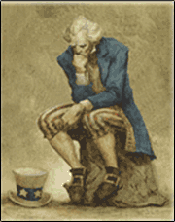
–>
January 23, 2023
As the 100-plus crowd exited the auditorium at the Museum of Jewish Heritage in New York, shuffling as crowds do when the hour is late and the temperature plunging, a voice behind me muttered “Mach schnell!”
‘); googletag.cmd.push(function () { googletag.display(‘div-gpt-ad-1609268089992-0’); }); }
I froze for a moment.
We had all been privy for the prior three hours to a compelling program dubbed “Remember This,” a movie/play of David Strathairn performing a lightly fictionalized compilation of the thoughts, perceptions and emotions of Polish patriot and Holocaust truth-teller, Jan Karski.
Karski entered into and escaped from many of the camps, as a personal devotion to what the Jews were experiencing. He brought his excruciating experiences to the U.S. president, Franklin Delano Roosevelt, who treated Karski and his scalding reports of the ongoing horrors in Europe dismissively, and changed his policies during WWII not one iota. FDR was no friend of the Jews, though I heard that assertion many times as I grew up in the States.
‘); googletag.cmd.push(function () { googletag.display(‘div-gpt-ad-1609270365559-0’); }); }
Karski told his impressions, his truths, while thousands of Jews still breathed. Many could have lived, if those he spoke to had listened to him. And acted to save them.
The evening was sobering, as the topic would of course have you believe. The two-hour, deeply painful monologue enacted against a stark white scrim, with only a plain table and two chairs in the frame behind the actor– who in his early 70s quite resembles Karski himself, whom I met in the company of my then-boss, the brilliant and original Sir Moshe Barr-Nea, a Holocaust survivor of, he told me, five concentration camps. I was honored to interview Karski in 1995, awed by his courage and dedication.
When we met Karski, he must have been in his late 70s, and had been teaching at Harvard for several decades by then, teaching about the Holocaust to the privileged offspring of privileged homes, with enough water and food.
When I heard that German phrase, so often bitterly flung at the millions of Jews experiencing their last days on earth, having just tumbled out of boxcars, starving, freezing, denuded of their all, “Mach schnell” evoked a chill in me, as in fact any spoken German does, even though I was never in the Holocaust, nor had I experienced any UberKommandos shouting their commands, dogs at their heels barking insanely at the terrified Jews shunted into queues that spelled further degradation—or gas chambers they suspected, perhaps, but could not then envision, so miserable were they in the crystalline moment of their lives’ peak horror.
My colleague had voiced the phrase, not meaning anything beyond a chuckle to get the people ahead to move along faster, out of the hall. It was late, and the museum is far downtown.
“Remember This” is a film, which is also performed as a play in select venues, and is designed to teach the less-knowing generations what the Shoah was. What it looked like. What it felt like. Witness.
‘); googletag.cmd.push(function () { googletag.display(‘div-gpt-ad-1609268078422-0’); }); } if (publir_show_ads) { document.write(“
And sadly, many even not-so-young citizens have only the fuzziest conception –if any—of that obscene Nazi effort at extinguishing the entire Jewish people.
On a hike in Riverdale, some years ago, I struck up a conversation with an attractive 40-something elegant local hiker. I happened to mention Auschwitz and the Holocaust, linked to some item in the news. This well-heeled modern, a Gentile I realized, had never heard of either. She was wholly unaware of this mid-century era of murder, torture, and blithe experimentation on human beings treated like lab rats.
She of course is among the many who still cannot say what exactly the “camps” were about. Who cannot name even one of the dozens of death camps sprinkled around Europe’s fine and thriving metropoli; who are unaware of the labor camps interning slave labor Jews all along North African countries—the “lucky Jews” not incarcerated and gassed to death in the Sobibors, the Bergen-Belsens, the Theresienstadts…just worked to death in the broiling equatorial sun and sands.
Karski died in 2013, after 40 years of Harvard classes, teaching the surreal realities of the Shoah.
Though the film is tightly claustrophobic, lighting changes and the mobility and verbal skill of Strathairn lend immediacy and power to the piercing emotional content he imparts to the silent audience.
The actor performs after removing his shoes, his tie, his jacket. He loosens the top button of his white shirt. He sits square face-forward on the spindly table. He gestures, stands, achieves a catalogue of calisthenics… of grief, pain, horror, incomprehension, terror. Memory too scalding to encompass.
After the sobering performance by Strathairn, TV personality and host Katie Couric moderated a somewhat after-the-fact panel on the impact of the Karski legacy, featuring a Holocaust survivor, Tovah, who was six-and-a-half years old when the camps were liberated; a producer of the film; and the actor himself.
Katie Couric shares the slightly shocking kernel that she never knew she was Jewish, that her mother was Jewish, until she was 10 years old, herself. She was raised Episcopalian, her family apparently unwilling to be treated the way they thought Jews in their upper middle-class suburb would be treated.
It emerged in the Q-and-A that for decades in the States, no one even spoke of the horror, as if it were bad manners to do so. Or as if Jews had something of which to be ashamed. Couric is 66, she acknowledged.
“Remember This” will be shown several times on PBS, Great Performances (March 13, first showing); at the JCC in Manhattan; at the Quad Cinema from January 27; and at the Laemmle Monica Film Center in Santa Monica, from February 3. It opens wide nationally after that.
It is a destination appointment for Jew or Gentile, young or old. No need to mach schnell, but go. Go.
Image: Lilly M, Małgorzata Miłaszewska-Duda, via Wikimedia Commons // CC BY-SA 3.0
<!– if(page_width_onload <= 479) { document.write("
“); googletag.cmd.push(function() { googletag.display(‘div-gpt-ad-1345489840937-4’); }); } –> If you experience technical problems, please write to [email protected]
FOLLOW US ON
<!–
–>
<!– _qoptions={ qacct:”p-9bKF-NgTuSFM6″ }; ![]() –> <!—-> <!– var addthis_share = { email_template: “new_template” } –>
–> <!—-> <!– var addthis_share = { email_template: “new_template” } –>







